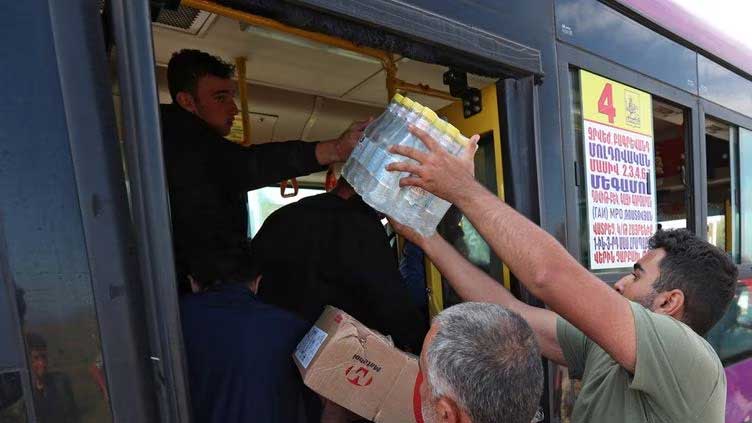Three quarters of Karabakh population already out in swift exodus

World
Three quarters of Karabakh population already out in swift exodus
KORNIDZOR, Armenia (Reuters) - More than three quarters of the 120,000-strong population of the ethnic Armenian breakaway region of Nagorno-Karabakh had fled by Friday afternoon after defeat by Azerbaijan, a faster-than-expected mass exodus that looked likely to be total.
Cars, buses and tractors carrying refugees crowded the highways on the fifth day of the exodus, which brought a sudden and decisive end to one of the most intractable of the decades-old ethnic "frozen conflicts" of the former Soviet Union.
Armenia's government said nearly 93,000 people had now crossed onto its territory, Russia's RIA news agency reported. Earlier, a U.N. refugee agency official said the total could reach 120,000, matching estimates of the entire population of the enclave, part of Azerbaijan that broke away in the 1990s.
Armenia, which supported the separatists for decades but ultimately proved powerless to protect them, sent city buses from its capital Yerevan to help bring people out. Volunteers greeted the purple buses on the road at the border, pushing boxes of bread and bottles of water through the windows.
Azerbaijan says it will respect the rights of ethnic Armenians who choose to stay, but that it has destroyed the concept of a breakaway state forever.
It said on Friday it would allow a U.N. team to visit the region within days, a major demand of Western countries.
REFUGEES
The Petrosyan family - Geghetsik, 65, husband Albert, 71, and their 30-year-old son Agasi who uses a wheelchair and has severe learning difficulties - spent a night in Goris on the Armenian side of the border after abandoning their home to escape. They strapped Agasi's wheelchair to the roof of their car as they headed out again to search for a place to live.
"We built our home so that everything would be nice for him," said Geghetsik, through tears, speaking of the accommodations they need for their son's disabilities. "I won't be able to find a flat now that will be good for him."
Azeri forces swiftly recaptured Karabakh last week, having sealed it off since the start of this year. Residents say they had suffered hunger and sickness during the effective siege.
"This is a situation where they've lived under nine months of blockade," Kavita Belani, UNHCR representative in Armenia, told a U.N. press briefing by video link. "And when they come in, they're full of anxiety, they're scared, they're frightened and they want answers."
She said agencies were prepared to cope with 120,000 people, having had to discard plans that anticipated up to 90,000.
Nearly a third of the refugees are children, including many separated from families.
"The situation often involves families arriving with children so weak that they have fainted in their parents' arms," said International Federation of Red Cross and Red Crescent Societies representative Hicham Diab.
BODIES
Carlos Morazzani, operations manager of the International Committee of the Red Cross, said it had transferred around 200 bodies out of Karabakh - victims of a huge blast at a fuel depot on the night the exodus started, as well as of recent fighting.
The Red Cross will be focusing on helping those left behind, with basic food and hygiene items, he said.

